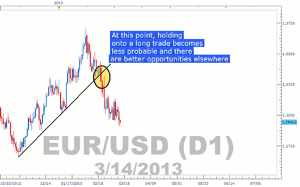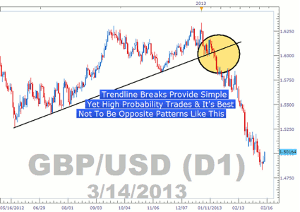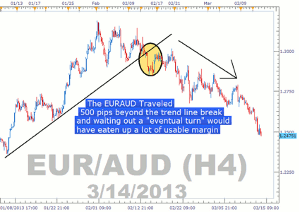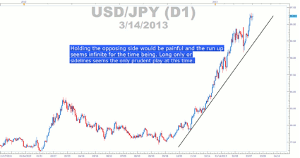If newer traders take a larger look at what they’re actually giving up by not booking a loss, they would be quicker to get out of the trade and move onto a better opportunity, writes Tyler Yell of DailyFX.com.
Forex traders come to this market to make money. That’s why we’re all here and that’s OK. What’s not OK is being so eager to enter trades in hopes of the big winner but refusing to close out a losing trade.
The reason for this phenomenon of traders perilously not wanting to let go of losing trades goes beyond the dangers that most traders would assume about holding on to losing trades. Namely, that we should close out the losing trades for the sake of obeying strong money management rules. This article will introduce you to a new way of thinking about holding losing trades, namely, thinking of the opportunity cost of holding onto a losing trade.
What Is Opportunity Cost & Why Is It Important To Traders?
Opportunity cost is an economic term that applies equally well to trading. Opportunity cost is the concept of measuring the value of the activity or trade that you’re currently engaged in against the next best alternative. The alternative in terms of trading would be the trade you’re currently holding vs. other opportunities.
The cost portion refers to the lost benefit of the forgone trade or trades after making and committing to your trade. Holding this concept in mind is mean to help you get out of the tunnel vision that the trade you’re in just has to work out. The goal really is that you would be less reluctant to close out a bad trade you’re in now for a better trade.
Why Hold onto EUR/USD Long When You Could Be Shorting GBP/USD?

(Created using FXCM’s Marketscope 2.0 charts)
Click
to Enlarge

(Created using FXCM’s Marketscope 2.0 charts)
Click
to Enlarge
One thing to keep in mind is that there will always be an opportunity cost in your trading career. Another set of trades could have outperformed your trading even if you had a stellar month or year. In that case, celebrate and get back to work of finding high probability trades but when the trade you’re holding isn’t working out, you would be well served to change your thinking from hoping that the trade you’re in finally turns to finding a better opportunity and dumping the trade you’re in.
There are many methods to find out whether or not your trade is a high-probability trade. The most basic range from major moving averages all the way to advanced techniques such as a volatility based system like the Ichimoku cloud. Whichever system you use is up to you but the idea is to notice as soon as possible when you’re on the wrong side of momentum and exit in hunt for a better trade instead of holding on in hope.
In the End the Prevailing Trend Usually Wins
The first cost that this article points out when holding a losing trade is the opportunity cost. The second cost is an ironic cost because traders often end up paying more for a bad trade when they were fighting to avoid paying anything in the first place. Moves like we’ve seen on EUR/AUD or anything against the USD of late is precisely why it’s important to close out a trade as soon as your entry signal is nullified or if you find a better opportunity than that trade you’re currently holding (See Cost #1).
Counter Trend Trading Can Be Frustrating & Costly

(Created using FXCM’s Marketscope 2.0 charts)
Click
to Enlarge
Fighting the trend is frustrating and there really is no way about it. One of the reasons for is costly frustration is because logic is often tossed aside (at least to the trader holding the opposing position) and euphoria (however temporary) takes over as new traders or investors are afraid of missing out on this great opportunity. Because of this, trends will often over extend before correcting and most traders do not have the capital, free margin, or patience to hold the opposing side of a runaway trend like the USD/JPY.
It’s Better to Be Not in the Trade Than Opposite the Trend

(Created using FXCM’s Marketscope 2.0 charts)
Click
to Enlarge
Closing Thoughts
Trading is a game of probabilities, patience, and pattern recognition. However, you shouldn’t be patient with losing trades because they are your enemy and the number one deterrent to your success. In the end, the thinking pattern above is a way to turn up the heat on cutting your losses short and letting your profits run.
By Tyler Yell, Trading Instructor, DailyFX.com





















